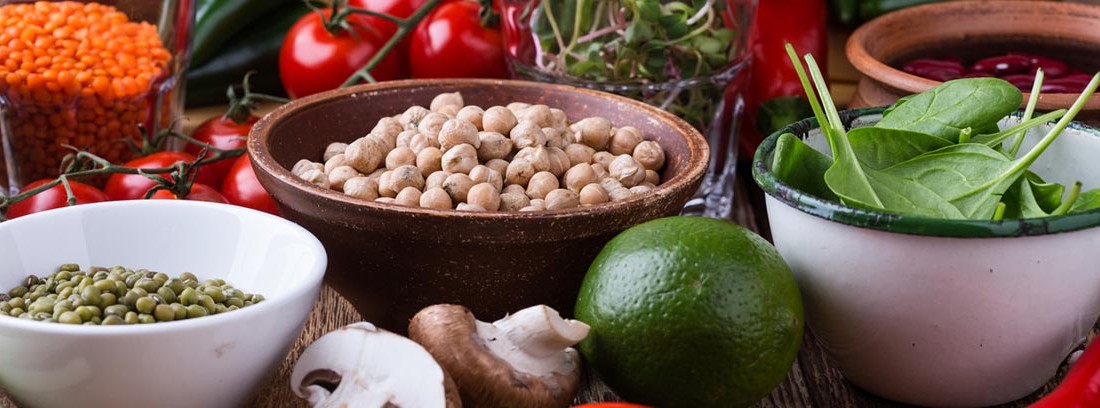RAW FOOD: Raw vegan food

The term "raw food" refers to a food trend that has been established in our country for years and that follows the precepts of a raw vegan food, that is, a diet based on plants and vegetables, mainly. In addition, these foods should not be subjected to any type of cooking or reach, as a maximum, temperatures of 40-42ºC
Bases of the Raw Food diet
The "raw" trend is a way of eating that promotes a lifestyle in in tune with nature, respecting as much as possible the way in which vegetables and fruits are harvested and consuming these foods naturally or with minimal processing. TO
others, this type of diet reject any ultra-processed or refined product.
Preparation techniques
Regarding food preparation techniques, the following methods are allowed:
- Marinated
- Pickled
- Low temperature cooking.
- Smoothie
- Dehydration
Allowed foods
The foods that are promoted in and that, therefore, are likely to be eaten raw or with the aforementioned methods are:
- Fresh and dehydrated fruits.
- Vegetables and vegetables.
- Seeds: flax, chia, sesame, poppy, etc.
- Nuts such as walnuts, almonds, hazelnuts, etc.
- Legumes (lentils, beans, chickpeas) and their sprouts.
- Cold pressed oils and fats.
- Infusions and teas.
- Fruit and vegetable juices or smoothies.
- Unpasteurized raw dairy products (milk and cheese).
- Unpasteurized raw meat.
Food NOT allowed
The foods that this type of diet excludes are:
- Baked goods.
- Fruits and vegetables cooked at temperatures above 40-42ºC.
- Cooked and processed meats.
- Roasted nuts and seeds.
- Refined oils.
- Table salt.
- Sugars, cereals and refined flours.
- Coffee.
- Alcohol
- Pasta
- Any processed, be it pastries, snacks or frozen products.
What are the benefits of eating Raw Food?
Naturally, the fact of promoting a diet based on vegetables, vegetables and fruits already means following one.
- It carries a greater contribution of soluble and insoluble fiber, essential for our intestinal microbiota and for the optimal functioning of the intestinal transit.
- Favor the consumption of these food raw minimizes losses of vitamins, minerals and fiber that occur during cooking processes.
- Improves dyslipidemia, such as cholesterol high, or since all kinds of processed sugars and carbohydrates and hydrogenated fats (compounds that promote these diseases) are eliminated.
- To level environmental sustainability, the reduction of energy and water consumption contributes to caring for the planet.
What risks can it pose to health?
When we handle food, hygiene is very important, especially if the food is going to be consumed raw; you need to wash and sanitize. But, in addition, there is because its consumption is only safe if it is subjected to cooking.
- Cooking improves the bioavailability and the positive effects of carotenoids present in foods such as oranges, tomatoes and carrots, since their absorption is low in raw foods and increases after cooking.
- Some minerals like calcium, are released when food is cooked, so its bioavailability will be greater in cooked food than in raw food.
- There is some risk of getting toxic-infectious diseases or adverse reactions when consuming certain raw foods such as potatoes, cassava or aubergines due to their solanine content, a substance that can cause stomach or neurological damage.
- Consumption of vegetables Raw can cause nausea and vomiting due to its lectin content.
Finally, this type of feeding not suitable for any individual since the fact of consuming raw food can make digestion difficult. Therefore, it is not recommended in people with chronic stomach problems or inflammatory bowel conditions (colitis, irritable bowel syndrome, Crohn's disease, etc.)
- This eating pattern has its benefits, but also its drawbacks if it is not done safely and while maintaining optimal hygiene practices.
- The raw-vegan diet is based on consuming foods that can be eaten raw, marinated, marinated, cooked at less than 40-42ºC, blended or dehydrated.
- It is not a type of diet suitable for everyone since the fact of consuming raw food can make digestion difficult.
Judith Torrell
Diploma in Human Nutrition
Clinical Nutrition Specialist
Teladoc Health Consulting Nutritionist
(Updated at Apr 15 / 2024)